Maxxe Albert-Deitch's Blog, page 4
October 5, 2021
Notes on NaNoWriMo: How to Preptober (as a Very Busy Person)
Hello lovely internet!
As (I hope) you all know, I write novels. I’m also a full-time grad student, in the process of applying for more grad programs and funding next year. I also tend to fill my time with things like distance running, baking, and rock climbing. So, yeah. Pretty overscheduled to begin with. But November… November’s a different beast.
[image error]Pexels.com" data-medium-file="https://memoriesonapage.files.wordpre..." data-large-file="https://memoriesonapage.files.wordpre..." src="https://memoriesonapage.files.wordpre..." alt="" class="wp-image-766" srcset="https://memoriesonapage.files.wordpre... 1024w, https://memoriesonapage.files.wordpre... 150w, https://memoriesonapage.files.wordpre... 300w, https://memoriesonapage.files.wordpre... 768w, https://memoriesonapage.files.wordpre... 1880w" sizes="(max-width: 1024px) 100vw, 1024px" />Photo by Jordan Benton on Pexels.comTo me, November has become synonymous with National Novel Writing Month—in 30 days, participants aim to write a 50,000 word novel in 30 days. This year will be my 10th year participating in NaNo. Some of my previous NaNo projects have led to books—2013 NaNo led to Touchstones, 2016 Camp NaNo led to Light of the Oceans, 2016 NaNo led to Ghost Army, aka the sequel to Touchstones (which I’m hoping to finish editing and officially release in early spring of 2022!), and so on.
Every time I mention to someone what I’m doing each November, people look at me like I’m crazy. “Fifty thousand words?” they ask. “You must be joking.” Sometimes people look at me sideways and then acknowledge out loud, “that must require a lot of planning.” And that’s the point that I think matters most—planning.
There are two approaches to NaNo: you can be a planner or a pantser (i.e. flying by the seat of your pants). I’m the kind of person who lives my life out of a color-coded Excel deadline spreadsheet and a bullet journal, bolstered by an online calendar. I should probably be a hardcore planner, but I’m not—I am what some people tend to call a “plantser,” where I make a clear-cut, organized plan, but I leave plenty of room for spontaneity. Why? Because writing is never, ever as linear as my outline and notes might make it seem.
That said, I do have some non-negotiable planning things that I make sure I do before every NaNoWriMo begins:
Story Threads— Like most creative folks I know, I usually have three to five potential writing projects rattling around in my head at any given point. But like many authors I know, I can only really focus on one at a time. This means that I only have one project actively turning into something novel-shaped (for me right now, that’s the sequel to All the Way Home), but I have multiple ideas and concepts that I’ve been playing with mentally for months now. I like to call this the “Ooh, Shiny! Phenomenon,” in which I focus on one piece and regularly get distracted by other ideas that I want to write about someday. Obviously, I can’t, so these ideas go into a “dump sheet,” where I jot down random ideas that I can’t let myself have brainspace for right now. At the moment, some of those concepts include… pirates, casket brides, Greek patron god relationships, magical scavenger hunts, queer romance, Viking magic, and cursed blades. Which, as you can imagine, is A Lot. So, in these weeks leading into NaNo, I take these disparate threads and start brainstorming how to bring them together—not beginning to weave the story, so to speak, but selecting a color palette and a texture. Some of those combinations won’t work, so I have to give myself time to play around with it.
Choosing a Vibe. There’s probably a better way to phrase this process, but this is what I’m going with. Of character, setting, mood, and conflict, I find that I usually start my books with some combination of setting and mood. Doing so allows me to figure out what the general aesthetic of my written world will look like, what kinds of conflicts might arise, what kind of characters that environment might produce. It’s a very anthropological approach to writing, honestly—people are informed by the worlds around them, so if I want to understand the characters I haven’t written yet, I have to start with the setting and the darker undercurrents running underneath it. In some ways, this process is really just genre selection: if I’m writing something set in a sunny field and a cute café in a small town, odds are I’m writing a rom-com. If I’m setting something in a military compound and a hospital, it’s something else entirely. Sometimes I’ll make a mood board, or I’ll start drawing maps, or just reading a lot in the genre I’m about to write.
Question words! Once I have a vibe to go for, I can start asking questions—as a historian, I usually revert to basic question words (who, what, why, when, where, and how) for any research, including my own totally fictional work. For a novel, that looks something like this:
WHO: are my characters?
WHAT: are they doing? What brings them together? What is their goal?
WHEN: does my story take place? What does the pacing look like?
WHERE: does the story happen? What does the setting look like? What parts of this setting are populated, and by whom?
WHY: are any of these people doing this? Why are they here? Most importantly, what do they want?
HOW: do these characters interact with one another? What are those dynamics? How does their environment inform their actions? Etc.
Once I have basic answers to those questions, I feel fairly comfortable starting to outline a rough plot. I tend to use a 3-to-5-act structure, but that’s not really important here—plenty of authors use totally different methods to structure their books. What does matter, I think, is getting a very basic “this is what happens” down on paper. For me, that’s chapter headings and bullet points, because my writing tends to happen very chronologically. That’s more complicated for people who write in flashbacks or with multiple timelines at play, but I still think it’s important to have a basic structure down on paper.
I gather my sources, and immerse myself in them if I can. Ignore what you’ve heard, no one just writes a book out of nothing. If I’m writing something historical, I research the period I’m writing in (yes, even if I think I know everything about it). I’ll watch YouTube videos about things like sword-forging, mountain-summitting, the theoretical physics behind spaceship engineering. It’s okay if I don’t totally understand it all, but I need to know enough to write about it without writing myself into avoidable knowledge gaps. Sometimes I even pick up new ideas that lead to extra plot points, or I learn that something I wanted to write about is totally unrealistic and needs some rethinking.
I go back to the outline, and try to turn it into something relatively story-shaped—in order, with some beats written in, with conflicts and climaxes, and travel plans and all of that. In an ideal world, knowing where my characters are and what they’re doing and why helps to avoid “scooby-dooing,” which is a term that my parents coined when reading an early draft of Light of the Oceans:it’s when my characters just kind of run from place to place doing pointless side quests while I try to figure out what they’re really doing. Having a solid outline down on paper doesn’t always work completely, but it usually helps.
And then… I leave it there. I know, y’all would expect me to have everything pre-drafted down to the last bit of dialogue, and then spend my writing time turning bullet points into paragraphs. But I don’t. I think pre-planning everything down to the last period is counterproductive—stories are fluid, and they change while I write them. I rarely get more annoyed than when I watch a TV show or read a book and they clearly planned an ending from the beginning and didn’t let it change to match how the story evolved (How I Met Your Mother and Gilmore Girls: A Year In The Life both irritated me quite a bit). Shows like Orphan Black and books like The Starless Sea or The Invisible Life of Addie Larue feel much more natural to me—they’re clearly meticulously planned, but there’s a little room left for evolution and the story is much stronger for it. I’m aware that I can’t plan everything down to the last detail, because I know that something’s going to deviate from the plan at some point. And that’s important, too– things aren’t going to go according to plan. That’s just a fact. So be prepared for that, and don’t beat yourself up about it too much if/when it happens.
I also make sure to keep an eye on my schedule through October—if there are hard deadlines that I know will trip me up in November, I do as much work as I can ahead of time in October. For me right now, that’s my statement of purpose for grad apps, a few book reviews for my classes, and outlines/annotated bibliographies for final papers. I also send emails out to my clients, requesting that if they have work for me through November, they send it to me by October 15th so that I can make sure it gets scheduled in.
Now you might be thinking, this sounds like so much work, is it really worth it? And you’re not exactly wrong. A whole book in a month can be an undertaking. And I’m already spending 30-40 hours/week on my MA, and another 20 hours on things like my job, graphic design clients, and this blog, not to mention time for working out, DnD, and socializing. So yes, it can be a lot. But… I also tend to write books during the week anyway? I usually devote a good 15-30 hours per week to that as is, and I usually end up with 30k words/month. So all I’m really doing is approaching NaNo with a little more focus than my usual projects, and budgeting my time for an extra 5ish hours/week. It’s hard, yes. But it’s doable.
I could write a whole post about why NaNoWriMo is a worthwhile endeavor—and also why for some authors, it’s actually kind of counterproductive. For me, it was the mechanism that led to my first novel, and many of the ones that followed. Writing every single day taught me a lot about how to structure my time, how to make time for creativity, and how to code-switch between academic writing and novel-ing. It’s also a social community, full of advice, commiseration, and people willing to psych up fellow NaNo-ers. NaNo was and continues to be a really important tool for me—but it’s just that, a tool. If it works for you, great. If not, I’m sure there’s something else out there that will. Likewise, these strategies are just my approach—if you want to try them out, great. I hope they’re helpful for you. I am just one voice among many with advice! When it feels like way too much work, it’s okay to pare down and simplify! If you feel woefully underprepared, an extensive process can help put you on more solid footing!
What are your favorite ways to manage your time going into a chaotic writing month? What are some of your favorite Preptober steps? For anyone looking to get into NaNo this year, feel free to check out this post I wrote all the way back in 2015, or comment with any questions you’d like me to answer!
Happy prepping!
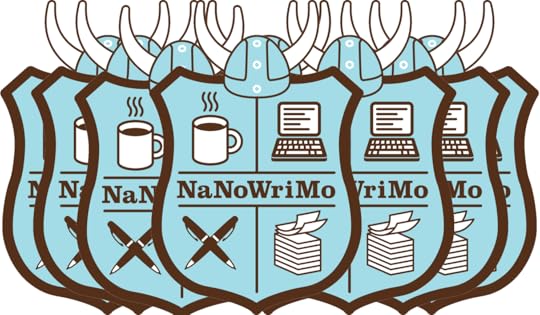
October 1, 2021
Food Diaries, Vol. II 10/01/21
Welcome back to Foodie Fridays! It’s officially October, which happens to be my favorite month of the year—the weather’s finally getting cool enough for hot beverages and cozy jackets, I can put a cinnamon broom on my door and bake apple-cinnamon rolls or pumpkin bread, and sit curled up in a blanket on my couch reading (or writing) a book while the leaves change color outside and Gilmore Girls plays on my laptop in the background. It’s the perfect month, the epitome of my favorite season.
Most importantly, it’s the best time of year for both great drinks and great books. So I’ve taken the liberty of compiling a list of thirteen excellent October books, as well as thirteen drinks to accompany them. So without further ado:
The Invisible Life of Addie LaRue, by VE Schwab: Hot Toddy, Or Something Much More French
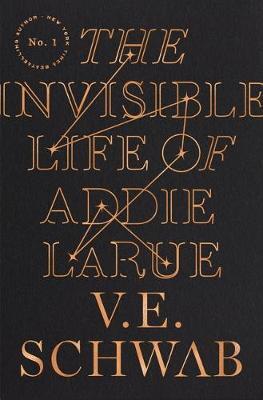

Any book that advises you to “never pray to the gods that answer after dark” is certainly spooky enough for any October list. Addiestrikes a dangerous deal: she’ll live forever, and no one will ever remember her. It’s a story about resilience, hope, and the price of getting what you want. Perhaps it’s just because Schwab’s own drink of choice seems to be high-quality whiskey, but I think it’s appropriate—Addie is a perfect book for cold nights and twinkly lights, and should be accompanied by a timeless, seemingly sweet drink with a bite to it. Honey, lemon, and whiskey seems like the right combination here.
The Atlas Six, by Olivie Blake: Espresso Martini
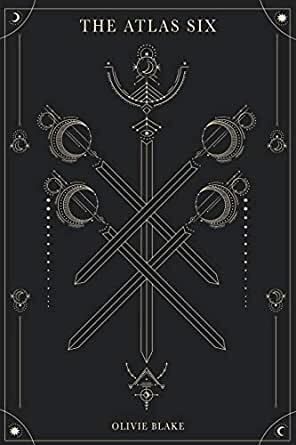
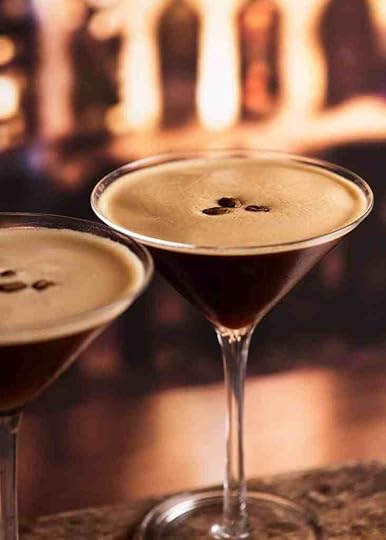
This book is… something else (see my full review here). It’s the kind of academic vibes that make you want to go live in a library, but with, y’know, the possibility of murder. This book makes you want to put on a fancy dress and read theoretical physics, so obviously one would want coffee for that, but it’s just light and fun enough that you want to drink a martini as well—think murder mystery dinner party, but with magic. Can’t go wrong with a slightly esoteric take on a classic—espresso martini it is.
The Grace Year, by Kim Liggett: Mulled Wine
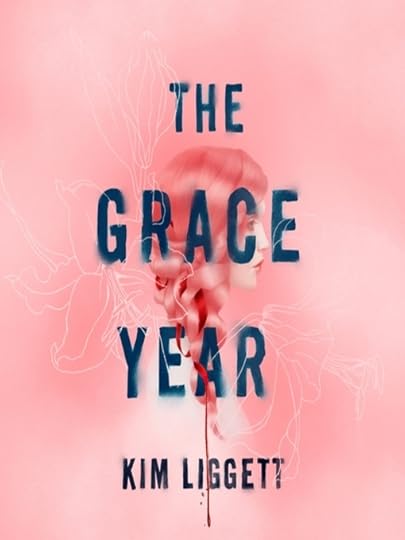
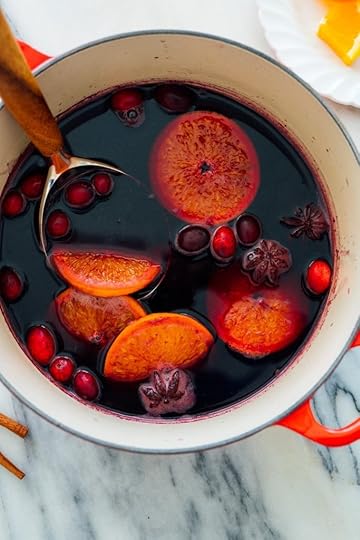
If you crossed The Handmaid’s Tale and Lord of the Flies, you’d get The Grace Year. It’s a sharp, gritty commentary on feminism, sexuality, and survival. Liggett digs into the relationships between folklore, femininity, and the dangers of the world at large. This book strikes a careful balance between genres, hovering on the line between dystopian commentary and survival thriller. A good, warming campfire drink seems fitting—spiced and sweet enough to be comforting, red and tannic enough to keep it from being too saccharine for the story.
Trigger Warning (but especially October Story), by Neil Gaiman: Mocha
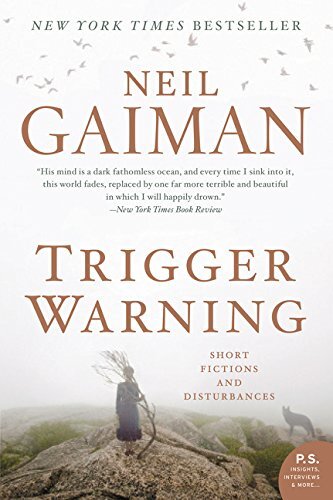

Honestly, I struggled to choose between Gaiman stories (my other top pick here would have been Sandman). Trigger Warning feels the most Octobery though, and some of that may be the inclusion of October Story, a sweet take on an old story. This collection of short stories is, as a whole, a bit creepy—it’s made up of familiar-feeling ghost stories and fictional think-pieces and it’s both familiar and not. A mocha feels like the right move here. Enough coffee to make it grown-up, enough chocolate to keep it sweet.
Jonathan Strange and Mr. Norrell, by Susanna Clarke: Espresso
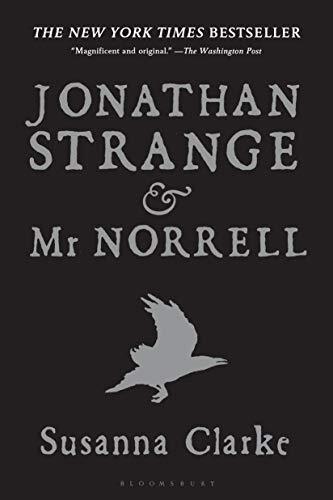

Strange and Norrell is one of those books that feels like a story you’ve always known but at the same time you have to read it again. It’s the kind of story that happens to be a colossal undertaking—imagine that there used to be magic in England, but now it’s been lost. Two people can still perform it—one is an old-school theoretician, diligent and anti-social, whereas the other is young and wild and perhaps too charismatic for his own good. Meanwhile, a prophecy and a morally questionable fairy lead a waltz into madness. It’s the kind of story that requires something simple, strong, and classic—and at the same time, it’s a massive tome, that perhaps requires a little help to keep you awake long enough to finish reading it. Espresso it is.
The Starless Sea, by Erin Morgenstern: Sidecar, no sugar. Obviously.
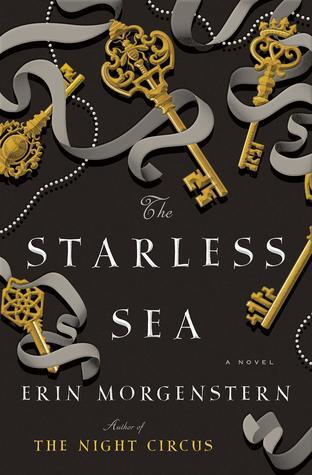
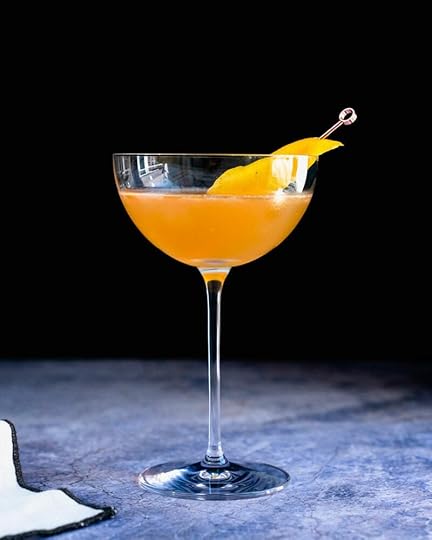
I considered assigning this one a Hot Toddy instead of Addie. The two stories remind me of one another, actually—I finished reading Addie around this time last year, and immediately felt the need to reread The Starless Sea. It’s a perfectly autumnal, bordering on wintery read, full of libraries and secret societies and mysterious prophecies and poisoned tea. It’s haunting, almost melodic, and somehow evokes lemon and honey and… I don’t know, maybe absinthe, with every page. A sidecar or perhaps a Sazerac feels appropriate—a little different, a little timeless, very citrusy, not too sweet.
Lore, by Alexandra Bracken: Creme Brûlée Latte.
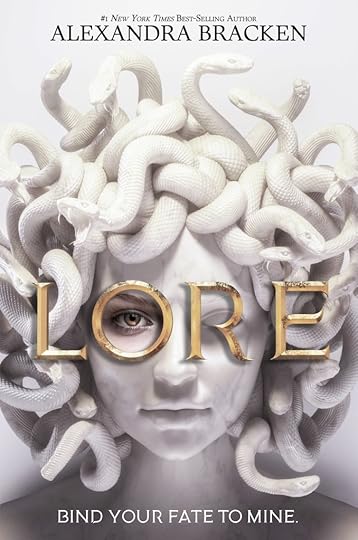

Lore is, in some ways, a spookier, scarier version of the early version of Percy Jackson crossed with Song of Achilles crossed with… oh, I don’t know, maybe Ralph Ellison? It’s a love letter to New York as much as it is to Greek mythology and secret societies and revolution. It’s a mystery, it’s a revenge story, it’s frothy and sits comfortably on the gap between YA and New Adult. Lore is one of those books that feels fun and seasonal and not-too-serious, filled with danger and found-family vibes in equal measure. A frothy, seasonal drink that cuts the bitter with significant amounts of sweet would match this page-turner well. If it’s too early for a crème brûlée latte, go with a caramel iced coffee instead.
Six of Crows, by Leigh Bardugo: A Cup of Hot Tea That You’ve Forgotten About and Now It’s Cold
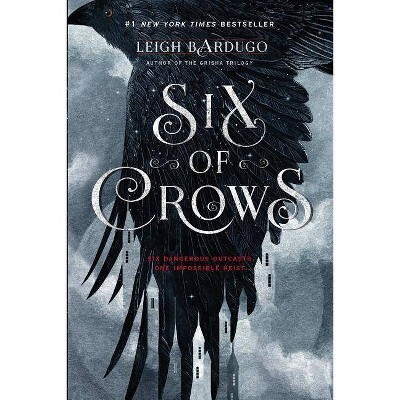

Speaking of found-family page turners, Six of Crows (which takes place in Leigh Bardugo’s Grishaverse) features personal revenge, mad heists, international conspiracies, and an incredibly cleverly designed magic system. Add into that an enemies-to-lovers plot, an assassin-tightrope-walker, and an antihero who might go too far at any given moment, place the whole thing in a snowy hellscape, and I’m absolutely there. Six-of-Crows is the kind of book that you pour yourself a nice cup of your favorite kind of tea and you start off regularly sipping while you read. But this book sneaks up on you and grabs your attention much harder after a few chapters—you’ll forget about that cup of tea soon enough and you’ll have to drink it cold or make yourself a new one. Sorry.
Bunny, by Mona Awad: Straight Vodka. You might need it.
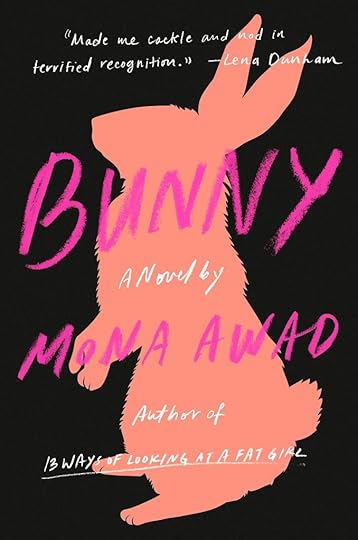
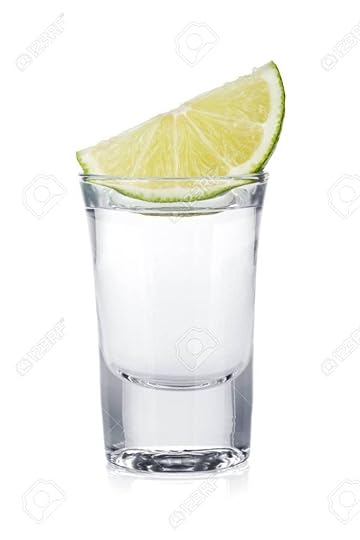 Shot of vodka and lime slice. Isolated on white background
Shot of vodka and lime slice. Isolated on white backgroundYou didn’t think I was going to make a list of October books without putting a proper horror story in here, did you? Bunny is perhaps the most bizarre psychological thriller I’ve read in a long time. It’s glittery, sparkly, sharp, and pointed all at the same time. It’s visceral, satirical, funny, and an incredibly biting commentary on the particular brand of cliquish women’s fiction literary elitism found in certain academic programs. I started this book without a clue of what I was getting into, and by the end… well, a shot of vodka might have helped.
Rules for Vanishing, by Kate Alice Marshall: Bourbon-Spiked Hot Cocoa
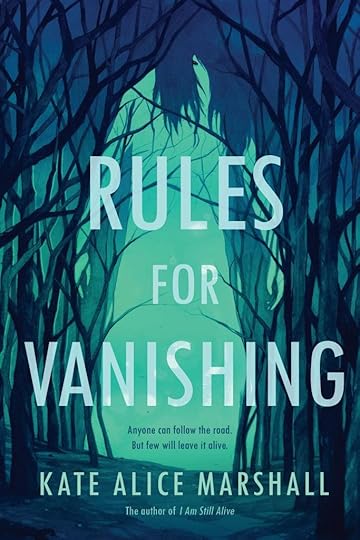

Another proper horror story here. Rules for Vanishing is like the most classic campfire horror story you could find, but mixed with the darkest parts of Maggie Stiefvater and the Blair Witch Project all in one. You get a missing girl, a vengeful ghost, completely terrifying descriptions of what happens when one breaks the rules that you should not, under any circumstances break. It’s brilliant. Read it in the dark, let it scare the hell out of you, treat it like a horror movie that you watch at one in the morning all alone and then regret when you try to go to sleep. It’s classic enough for hot chocolate, screwed up enough that you might need some alcohol, and definitely scary enough that you’ll want a hot mug to hold onto for comfort.
Sawkill Girls, by Claire Legrand: A Very Strong Cup of Tea (Chai Would Be Good).
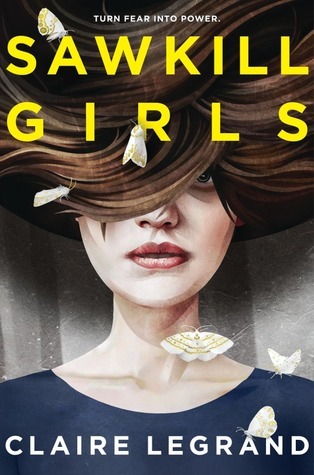
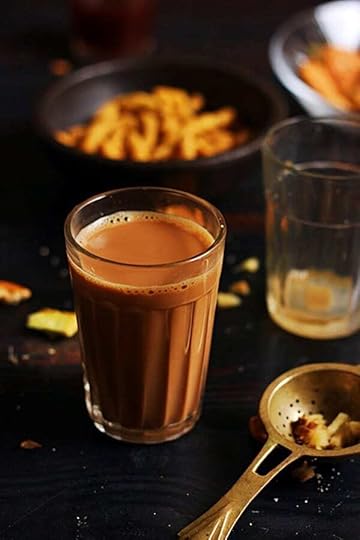
Another horror novel! Kind of, anyway. It’s set on a remote island, where girls tend to disappear mysteriously, going back decades, and no one seems to notice, or care. There’s a demon literally eating girls, a vaguely sentient island, and a lot of general commentary on rape culture, the patriarchy, and the sheer degree to which society considers girls expendable—they die all the time of course, so why not use some to do the establishment’s dirty work? This book feels very Buffy, in some ways, but with a take on feminism that feels far truer to the real thing. Legrand upends tropes left and right, from the Chosen One to the Final Girl to the concepts of victimhood and complicity. It’s gripping, whip-smart, requires a reader’s full attention. A strong cup of tea should help you immerse yourself in a story set on a rainy island, and it’ll keep you awake and focused enough to keep reading.
The Westing Game, by Ellen Raskin: Hot Apple Cider, Spiked If You Feel Like It
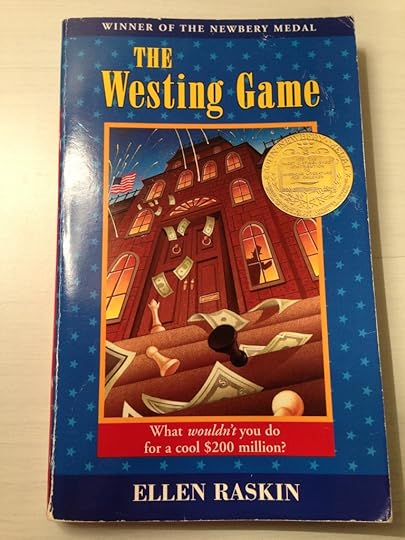
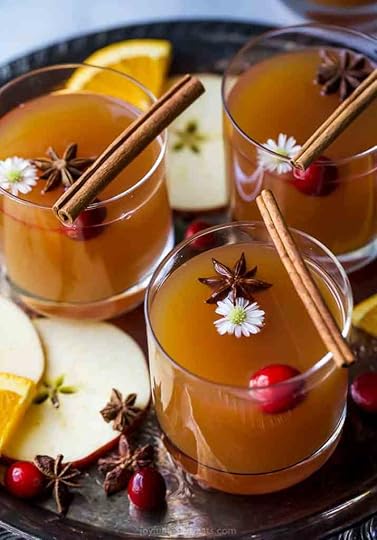
Ah, The Westing Game. A classic mystery, with a proper sense of a whodunnit and a series of riddles. It’s just generally excellent—it’s comforting, sometimes sweet, often complicated, great for all ages. There are bombs and letters and commentary on industry and what makes America. No one is perfect and that’s what makes them interesting. Read it nestled into a window seat or sitting in a tree, drinking something sweet and familiar.
Chasing Vermeer, by Blue Balliett: Hot Chocolate and a side of Blue M&Ms, obviously.
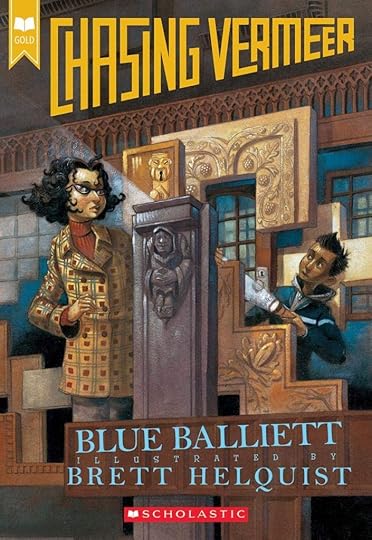
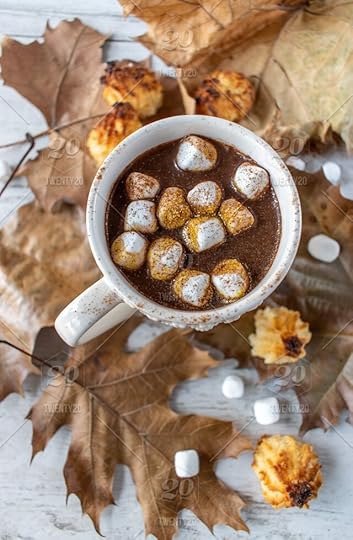
Another classic. Aimed at a younger audience, yes, but it’s also the book that sucked me into the world of Art History, and well… roughly fourteen years after reading it, here I am with degrees in History and Art History and a compulsive love for a good investigative mystery. I blame this book. It’s a puzzle, wrapped in a mystery, disguised as an adventure, set in autumnal Chicago and revolving around a missing painting. How could anyone not love it? Yes, it’s a kids’ book. I don’t care. Be a kid again for a few hours. Drink some cocoa. Add extra whipped cream. Reminisce a little.
September 26, 2021
The Atlas Six, and Yet Another Reason to Defend Fanfiction: A Book Review
I spent a large chunk of my day yesterday reading The Atlas Six, by Olivie Blake. I’d been looking forward to this book for months—I don’t think anyone on the planet would be surprised that I’d enjoy it. It’s an ensemble cast of flawed, intelligent, interesting characters. Anyone could be a villain. Everyone’s close to a breaking point. They’re all chasing knowledge, in some way or another. The plot revolves, in part, around the Library of Alexandria. Also, there’s murder.
So yeah, obviously. I liked it.
It helps, I think, that I’m familiar with Olivie Blake’s writing. How, you might ask? Well, some of you know that I read and write fanfiction. Olivie Blake does, too—and hers is unquestionably brilliant. She writes flawed-but-likeable very well—almost as well as she writes charismatic-slimy-and-utterly-unlikeable. Her writing is accessible, dreamlike, sharp. The Atlas Six strikes me as the kind of book that one cannot write without a great deal of practice—specifically, practice with character, with grandiose settings, and with a constant source of feedback allowing for evolution of writing style.
The kind of practice, that is, that you get while writing fanfiction. Which says something, I think, about how useful it is to be able to workshop a craft in a space where the only goal is to write, to publish, and to grow, as opposed to spaces where everything is driven by money and success. But I digress.
This is not to say, at all, that The Atlas Six reads like fanfic. It doesn’t. It reads like a fully-fleshed out world of its own. If it shares elements with other books that I love—magical secret societies, the intersection of magic and academia, alliances-with-benefits, rivalries-to-grudging friendships… well, that says more about what I love than what this author has borrowed from, I think.
Blake is a master of working with the elements of what makes a story—prose, character, setting, and conflict.
The prose is gorgeous, but ultimately not the strongest point. Fans of Ms. Blake’s know that her strength seems to have always been character– she writes dialogue and tone better than almost anyone. Her characters feel like people, they talk like people, and yet they are elevated—everyone, no matter how inconsequential, could Matter. Could be a Main Character. And that’s important—because in real life, no one sees themselves as the side character. Not really. Everyone can be a main character, with the right nudge—whether that’s a nudge to protagonism or over the edge into villainy. Blake understands that better than most, and it is this understanding, I think, that makes even the most lacking of her characters compelling. It’s also worth noting that she’s managed to write a surprisingly diverse cast of characters without making anything feel like token inclusion, which is great to see.
The setting works nicely, but for me, there isn’t much to say about it—despite the fact that these characters are, ostensibly, in a gorgeous library in London, we never see much of London or the library. Which, to me, is a shame—I’d have liked to see more there. I wanted a Sanctum Sanctorum and I got… a study room in the British Library, or the conference room in the building where I had classes when I studied abroad. Blake is capable of lush, grand, sweeping descriptions—I spent some of this book wishing for more of them.
That said, the book redeems itself when it comes to conflict. Having read some of Blake’s other work, I can confirm that this is where Blake excels. What happens when you place six extremely bright, very magical people in a house together, tell them that five will achieve infinite knowledge and entrance to a secret society and the sixth simply won’t? The premise of the novel is in itself a conflict. Every character enters aware that this is a competition. Some are framing their fellow inductees as allies or foes or competition from the start, whereas others are looking for friends. One in particular enters, apparently looking for an enemy. Conflict is all about perspective, and implicit understanding of character. Blake’s inherent sense of both works beautifully.
I’d recommend The Atlas Six for people whose answer to “If you could go back in time to any era, where/when would you go?” is “The Library of Alexandria.” I’d also recommend it to people who loved The Invisible Life of Addie Larue as much as I did, for those who read Erin Morgenstern’s work, for anyone looking for a good trolley problem in the shape of a book, for those who like double-crosses and the idea of poisoning someone over tea while wearing a brocade gown.
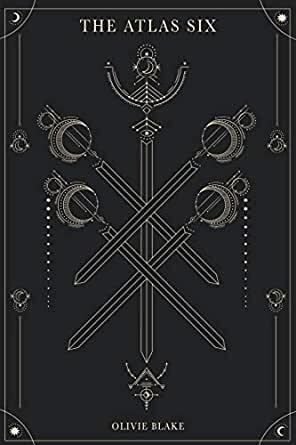
September 20, 2021
Shakespeare, Anne of Green Gables, and Why I Love Rom Coms: Some Thoughts
About a week ago, my mom– who was one of the first readers of my most recent novel, All the Way Home— sent me this article about Anne of Green Gables, by Lucy Maud Montgomery. None of this was, in itself, unusual: I talk to my mom a lot, we often talk about books, and Anne is a mutual favorite. But it was the text accompanying the article that made me do a literal spit-take.
The description of when Anne met Gilbert is remarkably like when Kaylee met Bryce. Coincidence?
The honest answer was yes. Coincidence, completely. I didn’t even realize how similar the scenes are. Of course, Montgomery was writing in the 1910s, and I’m writing in the 2020s– over a hundred years separate our characters. Likewise, her protagonist is eleven or twelve at the onset of the book, and mine’s twenty-two. But I can’t deny that my own scene probably does have something to do with Anne, after all.
For one thing, I have a thing for writing fiery protagonists with a clever wit and a sharp sense of humor. For another, rivals-to-lovers romance has always been my favorite– in fact, I’ll pick rivals-to-lovers over enemies-to-lovers over friends-to-lovers pretty much every single time. And yes, for anyone who’s read more than one of my books, they all center around characters who live with their heads a bit in the clouds, who dream big dreams and have big hearts and make stupid choices because of their own hubris, because they see the big picture but not what’s right in front of them. These characters are a lot like Anne– and a lot like me. You see, Anne Shirley has always been a favorite of mine, largely because I see so much of myself in her (or maybe because I see her in me, now). I think I gravitate to characters like that out of habit as much as instinct– and it shows.
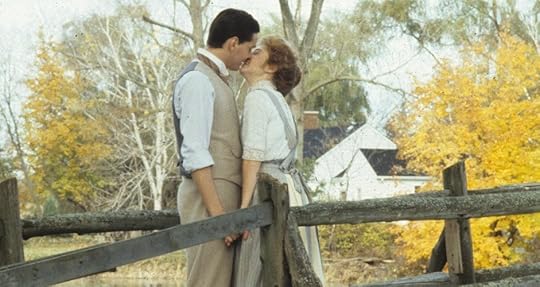
I also can’t deny that AOGG is also one of my base blueprints for what makes a good love story. My taste in romance can generally be defined as “people who make incredibly bad first impressions manage to fall in love anyway,” and “competitive natures make sparks fly.” Maybe that’s because I grew up on Anne. Maybe it’s because my parents are maybe more in love with each other than any other two people on the planet, and their version of flirting is really competitive Scrabble. My characters flirt like I do, and I tend to rely on witty banter, and a healthy dose of competition, and the ability to crack a smile while also trying to ruthlessly destroy someone in Bananagrams or Gin. So yeah, some of it’s just… natural.
That said, rom-coms are a genre. There have to be characters, and a setting, and somewhere in there, there needs to be a conflict. Without conflict, the characters just fall for each other in the first ten pages and then you have no story. The characters need a reason not to just immediately start dating. So I introduce a rivalry. A reason they can’t, or don’t want to, get along. But in the end, love is inevitable– or at least, flirting is. Because that’s what happens when people like each other, despite their reasons not to. And as much as I like grueling competition, I like happy endings better.
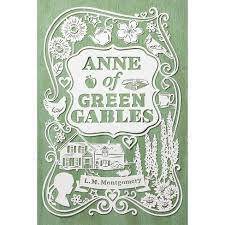
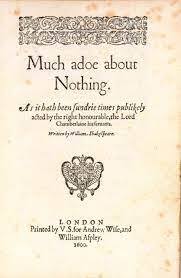
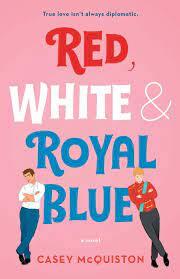
The same can be said for my favorite Shakespeare play. Much Ado About Nothing is entirely my favorite– and yes, it’s similar in its enemies/rivals-to-lovers tendencies. Sharp-tongued, clever, intelligent people who don’t like each other slowly fall in love through a series of debacles, as they each realize just how smart and kind the object of their affections is capable of being. It’s my favorite kind of story– the stakes are high (ish), the banter is witty, the female protagonist is fun and funny and flawed and relatable, and the male love interest manages to retain some sweep-off-the-feet-knight-in-shining-armor qualities, it’s his personality that gets the girl in the end.
I’d say that it’s a bit hard to find these qualities in LGBTQ+ fiction, but that would be a complete and total lie. Red, White, and Royal Blue, by Casey McQuiston. Probably 90% of Becky Albertalli’s Creekwood canon. How to Find a Princess, by Alyssa Cole. There are others, those are just the ones on my bookshelf right now.
Don’t get me wrong– there’s a place for dreamy, sweep-you-off-your feet romance, or girl-next-door romance, or coming-of-age-story romance. I appreciate those as much as the next girl. But I think Sarah J. Maas has that covered, as does Rainbow Rowell, as does Taylor Jenkins Reid. I’ll read those books, and name them as favorites even, but when I’m looking for the kind of romance that will stick in my brain for a while, set new standards for me, move the bar even higher… I’m thinking about Gilbert Blythe, Benedick (sometimes), the characters from Sandyha Menon’s books, Beach Read, by Emily Henry, Last Chance Books, by Kelsey Rodkey. No one’s trying to kill each other, no one’s in a contest to the death, they’re just… people. Navigating their feelings. It’s rivals to lovers, not enemies to lovers. I think a rivalry is healthy, and attainable. Enemy-ship just seems… well, a little toxic. Which again, I love in a book. But as far as wanting it in my life… no, thanks.
One of my favorite things about the romance genre as a whole is, really, the fact that there’s a love story for everyone there. Romance writers and readers believe, unabashedly, in happily-ever-afters. Protagonists are almost always badass women who don’t have to sacrifice femininity in favor of strength– they can be both, just like real women. The genre itself is an expression of feminism and female empowerment (I have a lot of things to say about romance novels, and why the genre is so important– and why people should just stop judging them so harshly already, darn it. If that’s something you’d like to read, drop a comment– maybe that’ll be next week’s post).
All I’m trying to say here is that the kinds of love stories I loved as a kid– the kind that made me fall in love with love in the first place– happen to be about intellectualism and wit and reconciling differences. I love those kinds of stories so much that they made their way into my own writing without me realizing it. And I just think there’s soemthing really beautiful about that.
Read the first chapter of All the Way Home (for free!) here.
By the way, if you’re new here– hello, I’m Maxxe! I’m a grad student and author, and I also write books! I write lit fic novels under the name Maxxe Riann, and rom coms and romances under the name Gemma Tate. This blog is where I ramble about books, life, writing, etc– follow, or subscribe to my email list, if you’d like to keep up with book updates (or just my thoughts on life, the universe, and all its books).
All the Way Home, Chapter I
Early morning is the best time for a drive through Rose Creek. People always describe sunrise as pink aurora’s fingers of rosy dawn or whatever, but whoever said that obviously never woke up early enough to see one. Or maybe who had only seen one in a city with extreme light pollution. Or before the days of light pollution at all. My light-blue Silverado with the scratched-up left taillight rumbles up the road past faded fence lines, jostling slightly when paved roads turn to dirt and then back again, towards a sunrise that isn’t pink or rosy at all. It’s orange, with bits of purple shot through, and blue-tinted cloudy white at the edges. Like a very vibrant sno-cone, orange-cherry tie-dye bleeding over a white T-shirt. I can’t help the smile that drifts over my face upon seeing the warm shades start their surprisingly quick fade to open-sky blue.
The third song on my drive-to-work playlist starts, and with a quick jolt of “she would have made such a lovely bride, what a shame she’s fucked in the head,” I check the clock on the dash: five thirty-five, which really means five-thirty-two because I never quite got out of the habit of keeping it three minutes fast. That means that I’ve got something like two minutes to get to the field behind the old Somerset farm if I want a thirty-minute workout… I tap the wheel in time to the music and push the gas harder.
Precisely two minutes and ten seconds later, my pickup clunks around the turn to the Somerset property. I drive past an empty stable with a falling-in door, a field of goats that probably isn’t supposed to be there, and a single chicken who just looks very lost. As usual, I park in the gravel lot at the top of the hill and make my way down to the field at the very bottom. I tug at the hem of my spandex shorts and the straps of my pink sports bra. The shorts are a little too big now, my gray tank top a little too small, and the early-morning air is deceptively damp and cool on my skin considering how much the mid-May heat is going to ramp up in just a few hours when the sun crests over the barns and trees. I sigh, plug in my headphones, and start to jog down the hill for a warmup.
Only to stop in my tracks, one Taylor Swift chorus later, because what the hell, there is someone else in the field. Not that it’s mineor anything, but I’ve been coming here since eighth grade and every break in college, and no one except the people who own the land and the farm animals has ever been over here this early in the morning. The Somersets are nice folks, and they’re away for the summer, so theoretically I’ve got free run of the place. But today, there’s… a guy. Wearing one of those tank tops that barely counts as a shirt because of how much skin it leaves exposed on the sides. And he’s throwing white projectiles that have to be baseballs—unless they’re wiffleballs for some reason, which would make even less sense– at haybales stacked at the edge of the field. Right where I usually start my warmup jog. I skip the song to something more fitting to my new, much less cheerful mood. Mentally recalculating my warmup path to the other side of the field, closer to the barn than to the trees, I set off again to the dulcet tones of pissed-off 00s pop-rock. Green Day hadn’t been the mood I was going for originally, but if there’s a random dude in the field, then this isn’t a Taylor Swift sunrise morning anymore, it’s a what-the-fuck-I-came-out-here-to-commune-with-nature-alone-and-there-are-baseballs-in-the-haybale existential annoyance.
My pace picks up to reflect the change in music—my normally easygoing warmup strides shift into a harder, more explosive sprint, closer to a power run for a vault than to the jog around the floor I used to do back in the gym. It doesn’t take long before my skin is slick with sweat, and even the gentle late-spring morning breeze isn’t enough to cool my face, which I’m sure is tomato-red by now. After the fifth song—about ten minutes—I let my steps rubber band snap themselves into a stop, leaving me stumbling for a few paces before I pull up short.
I glance over at the other side of the field. The guy is still over there, but now he’s watching me. Not in, like, a threatening way, just in a oh, hey look, someone else in the field kind of way. Arms crossed, in a way that… well, he’s still a good forty feet away, but I do have eyes. And even if I didn’t, those biceps would’ve been hard to miss. He lifts a hand in a wave, with a smile that might’ve been charming if I wasn’t still annoyed at his presence, revealing abs that ripple down his front like a damn anatomy textbook. I pull my gaze back up and give a short, annoyed wave back.
I’m ten reps into a set of alternating handstand walks illusions when I feel a nudge in my side and look down to see a baby goat with white and brown spots headbutting me gently in the leg. I sigh, scoop her up and let her little head settle on my shoulder where she proceeds to nibble at the end of my ponytail while I deposit her over with the rest of the herd up the hill. Goats are nothing new around Rose Creek—half of my neighbors have goats, and most of them have a habit of getting out and wandering around the town. The goats, that is, not the neighbors. These guys apparently included. Once the kid is safely ensconced back with the rest of the goats, I jog back down the hill. I glance over again—the guy is a good twenty feet or so closer now, and clearly looking at me with a smirk.
A smirk. As though goats were something to smirk at, as though my workout is something to laugh at in comparison to his…whatever he’s doing out here. I scowl and set down my phone. I hadn’t planned on any tumbling today, and the old injuries in my knee and foot twinge in anticipation as I eye a flat stretch of ground that I know from my warmup is free of divots or sticks. I ignore the reminders my body’s sending me, and I set up for a run anyway. I set my shoulders, lift one knee so that my toe taps my shin, listen for an imaginary beep, and sprint down the grass like it’s a vault runway. I launch into a modified series from an old routine—punch front, step out, two steps, roundoff, back handspring step out, back pike. I don’t quite stick the landing, but the two little hops backwards help alleviate some of the pain in my foot as I come down onto the grass. I don’t let myself think about the fact that I used to do an Arabian and a double tuck in that same pass. Better not to dwell on that. Instead, I relish the feeling of flying through the air, feet over my head, solidly gaining speed out of that first flip and powering through the momentum of the rest of the pass. It’s the closest a human can ever get to flying, I’m convinced.
I look over at the guy and give a short little nod, the kind of chin jerk that used to signal confidence in a gym, back when I was confident in a gym. I’ve been coming to this field for years though, running choreo and tumbling runs for just as long. So there. I brush the grass off of my hands and walk towards him, resisting the urge to smooth back my ponytail. And fuck, those arms are even more impressive up close—practically the size of my leg, all made of wiry, ropy muscle. I realize that I’m staring, and carefully wipe my face politely clean of anything even remotely resembling attraction. I offer a pleasant, if chilly, smile.
“Hi. Mind if I ask what you’re doing over here this morning?”
His eyebrows lift, the light streaks in his tousled dark hair catching the sun. “Just gettin’ my morning workout in, same’s you seem to be.”
Great. So he’s from around here, then. Which means I should probably know who he is, but I just can’t place his face, and he’s good-looking enough that I probably would’ve remembered it if I had met him. His accent is stronger than mine, but then, I spent every weekend from when I was five in the city for gymnastics, and then I left for school, so that makes sense. But that accent is unmistakable, at least to anyone who grew up in southeast Georgia, the part of the state that wants to be a South Carolina beach town but still has enough farmland that it can’t quite pass itself off as a vacation destination, either.
“And your morning workout involves… torturing a poor haybale?” I ask, gesturing towards the bale in question.
He laughs, and it’s a cross between a chortle and a low rumble somewhere in his chest, and I can’t help but smile a little in response.
“I’m Bryce Hanson.” He smiles, showing off cute little all-American dimples, and pauses like I’m supposed to know who he is as he sticks out a hand for me to shake.
I grip firmly and shake once before withdrawing. “Kaylee,” I reply. “and you didn’t answer the question about the haybale.”
His smile widens, and there’s that smirk again. “I’m Bryce Hanson,” he repeats.
I cross my arms and raise my eyebrows. I was a female athlete at UCLA, doing a sport that required skintight clothes and makeup. Of course I’ve met guys like this before: pretty boys with big egos who think that a set of abs and the ability to throw a ball make them God’s gift to women, or that dimples and pickup lines are the same thing as a personality. I’m not impressed.
He rolls his eyes. “I went to Rose Creek High, got the minors contract a few years back? Got a town parade and everything, it’s really…” he takes another look at me. “Huh. You really don’t have a clue who I am, do you?”
“Nope.” I give him another once-over, from his remarkably well-muscled thighs to his impressive abs and chest to that face which has gone from annoying to infuriating remarkably quickly. “Don’t think I’ve seen you around, even.”
Bryce frowns briefly, and for a second I think that maybe I’ve struck a chord, but then the smirk is back, and I realize that all I’ve done is pose a challenge. “Oh, really. Well, Miss Kaylee, if you do want to know who I am… we could always take this from out here to…”
I can’t help it, I have to laugh. “What, dinner? The sheets? Please tell me you know that no amount of pretty muscle or town parades can make up for the sheer lack of game in that line.”
He lifts an arm to scratch the back of his neck, and I’d think he’s being self-conscious if it weren’t for the fact that he’s still smirking. “So, the muscles are pretty, huh.”
“Ugh.” I roll my eyes. “I didn’t actually say that. But in any case. I assume you’re throwing baseballs at haybales because… what, you don’t have a practice mound?”
“Oh, there is one.” He shrugs. “But I like it out here. Nature ’n’ goats and all that. Plus the bullpen isn’t open this early in the morning, and I like to get an extra warmup in before practice with the team. Gives me an edge.”
I mean, fair. But the way he says it… “You’ve been coming here awhile, then?”
“Just since I started pitching for the Peaches, so… round about three years, I’d hazard? Maybe four?” He gives me another look. “I’ve never seen you around here, though.”
Three or four years. So, right after I left for school, then. “I’ve been coming out here since high school.” I plant my hands on my hips, fully aware that I’m a good foot shorter than he is and probably not terribly intimidating, but I’m not sure I care. “And you pitch for an actual honest-to-goodness professional team. Is there really nowhere else to throw things.”
He stares at me like I’ve grown a third head and it’s got purple eyeballs. “I’m sorry, are you asking me to leave? Because you think you were here first? So that you can do your little flounces and flips?”
I stand my ground. “I don’t care if you’re working out here. I can work around a workout. But you’re throwing things, and that just makes it hard to focus for fear of a full-on concussion. And those flounces and flips got me a free ride to UCLA, thank you very much, so I don’t see where you get off on being condescending about it.” Just then, my phone buzzes—my alarm telling me it’s time to go to work. I hit the screen to make it stop, then return to my generally aggravated stance. “I have to go. But if you’re here tomorrow…” I don’t bother finishing the sentence. I just turn on my heel and head up the hill, past the goats, past the chicken, past the falling-in barn and up to my truck.
“Ma-a-a-ah.” I hear a plaintive little bleat by knees as I open the driver door. I glance down and there’s that little brown-and-white kid again.
“I can’t take you with me, bud.” I tell her as I gently nudge her away from my door. “Why don’t you go back down the hill to the rest of your herd? And make sure you steer clear of flying baseballs.”
I drive to Port and Starboard, the café where I’ve been working every summer since high school, and park in my regular space, three to the right and under a huge white oak tree that sometimes drops acorns but mostly just shades my front seats nicely. I turn off my music and take a few gulps from my waterbottle before I go inside. The blue awning and door handles shaped like little ship’s wheels always make me take a deep breath and remember that I do actually like Rose Creek. Maybe I don’t want to live here forever, but… for now, it’s fine.
I head straight for the stairs at the very back of the café—it’s a little spiral staircase that leads up the apartment above the shop. I go to ring the bell, but the door swings open before I get a chance. My friend Elle sweeps me inside, and I barely get a chance to register that she’s dyed the front bits of her blonde hair a different color pink, or that she’s wearing seashells as earrings, before she’s shoving me towards the bathroom, already talking a mile a minute.
“Kaylee! Good thing you’re here, I’ve already got the shop opened up, I was going to put you on bakery and I’d be on drinks but then I remembered that we’ve got the new produce order coming in so I’ll be on baked goods and you’ll be on espresso if that’s okay with you, and by the way I set aside some muffins so those are already ready for us, but go ahead and shower you’ve got about eight minutes so you probably don’t have time to blow dry but that’s plenty of time to get the grass off and why do you smell like you picked up a goat?”
By the time Elle pauses for air, I’ve already scooched my way into her shower. I close the door firmly but respond loudly enough that she can hear me. “Because I did! There’s a new herd over by the Somerset place, and one of them kept getting in my way so I just kind of picked her up and moved her.”
“Tribe!” Elle chirps back through the closed door.
I frown, stripping and turning on the shower, nearly tripping over my own spandex shorts. “What?” I yell over the water.
“Tribe! Not herd. Well, kind of both. Collective nouns are weird.”
I poke past all of Elle’s blonde-hair specialty products and purple shampoos and color-safe conditioners until I find my own peach-and-lemon scented shampoo. I don’t even live here, but it’s become habit to just come up to Elle’s on mornings that we’re both working—it’s faster than driving all the way home and then back to town.
A few minutes later, I’m showered, and my hair is wrapped in a towel turban. I wrestle my way into the denim shorts and the black Port and Starboard tee that I brought with me. Technically speaking, there isn’t actually a uniform here, so I don’t really have to wear the shirt, but I like it—and comfortable, super soft and a little too big because I bought it when I was fourteen and thought there might be a growth spurt in there somewhere, before I even worked here. I pull the towel off of my head and run a brush through it. Deftly, I wrap the wet strands into a coil at the nape of my neck and crack the door open.
“Elle, can I borrow a scarf?”
“Like a fashion scarf, a wool scarf, or a hair scarf?” she shoots back.
“Hair, please.”
A minute later, she’s passed over a blue-gold-and-white silk scarf. I wrap it around the base of my bun and tie it in a bow, leaving the ends loose to dangle over my neck.
“You’re a lifesaver,” I tell her as I hang up the towel I used and stuff my gross workout clothes into a bag.
“I do what I have to do to make sure my underlings are presentable,” she laughs as we both head downstairs.
I can smell cinnamon, which means that Elle already got the bakery set up before I got to work this morning. I swear, she makes my early mornings look like a joke. Which is probably how she got promoted to manager and also managed to score the apartment above this place— she kept working over the school years, too, doing correspondence courses, and somehow managed to graduate before me and make this place crazy successful along the way. I don’t begrudge her the success; she’s worked her ass off for it.
“Strawberry muffins?” I ask hopefully.
“You know it,” she grins back.
The muffins are, as always, delicious. They’re really more like muffin-sized Dutch Babies than proper muffins, but the last time I mentioned it to Elle I got an earful about how the chemistry is apparently completely different and one gets made all in one bowl and the other requires folding… so muffins they are. They’re these super-soft, almost-cake like texture that Elle swears isn’t that bad for you, with little bits of freeze-dried strawberry baked into the tops in a heart pattern, and a core made of homemade strawberry jam. The candied lemon peels and powdered sugar on the tops just make them even better, and they are the best after an early-summer run. Elle and I eat as we tie our aprons around our waists and go about our typical opening routine.
The process of setting up the café is always an easy one, made more so over time. First things first, I turn on the speaker—music at Port and Starboard is always barista’s choice, so I toss on a Beatles mix. Elle and I sing along to “Lucy in the Sky with Diamonds” as I double-check the stock of milks—skim, two percent, whole, almond, oat, soy—in the low fridge and the stock of syrups on the counter, while beans for today grind. I turn on all of the machines, make sure I have the right number of espresso scoops, and set today’s drip coffee to brew. Elle’s apparently already been down here, because the lights are on, the tables are clear, and it looks like spot-sweeping’s been done too. She’s up on a stepladder redoing some of the chalk lettering on our menu—swapping out chocolate biscotti for lemon-white chocolate scones, and it looks like we have a salted-caramel stuffed cookie now.
“So, you’ll never guess what happened,” I tell her when the coffee grinder quiets down.
“What?” she asks from up on the stepladder.
“I went out past the Somerset house like I do every morning.”
“Right…”
“And there was a guy there. Bryce something?”
“Bryce Hanson?” Elle shrieks, nearly falling from the rung she’s balanced on. “The baseball player?”
I quickly move to stabilize the ladder under her. “Yes, the baseball player. And he was…”
“Hot? Stunning? In incredibly good shape?” Elle supplies.
“No…” I pause. “Okay, well, yes. But also a spectacular jerk. And not just because he was in my workout spot. He hit on me, and then called gymnastics stupid.”
“He hit on you?”
“I turned him down. Obviously.” The ladder shakes a bit as Elle reaches to neaten a particularly high-up line. “You know, this would probably be easier if we just took down the boards and put them on a table,” I point out.
“We’re both under five-foot-three, Kay. How do you propose we’d put them back up again? Besides, it’s an artistic challenge.” She says. Then she pauses, processing. “Wait a minute, why did he know you do gymnastics? Or did he just bring it up out of the blue?”
“I may have been slightly annoyed that he was chucking baseballs at random haybales and thought for a minute that chucking a few flips would intimidate him enough to get him to move,” I admit. “Needless to say, it didn’t work.”
Elle finishes the last of the chalkboard lettering and hops back down from the ladder. “Okay, so what I’m hearing is that the hottest guy to ever graduate Rose Creek High was interested in you, and you turned him down, and you were tumbling again? And you look, like, not broken? That sounds like a hell of a morning for you, Kaylee.”
“Well, when you put it like that.” Now that my friend is back on flat ground again, I stomp over to the coffee machine and make myself a latte just the way I like it—two pumps caramel, one pump hazelnut, oat milk and almond milk foamed together, and a precise dusting of cinnamon over the top. Perfect. “Elle, he called it flouncing.”
“Oof.” She shakes her head and I watch her expression shift from surprise to annoyance. “Well, there goes any chance he had.” She eyes my latte. “Make me one of those? Yours always come out better than mine.”
I do, and she sips it with an appreciative smile. She’s looking at me like she wants to say something else when a small group of men and women in suits and heels (respectively) walk through the door. I change the music coming over the speaker to a Kacey Musgraves song that fits the hot sunny day I know we’re about to have, and Elle mouths “we’ll talk about this later,” over her shoulder. I roll my eyes, take another sip of my latte, and the two of us get to work.
For more, please check out the full book HERE.
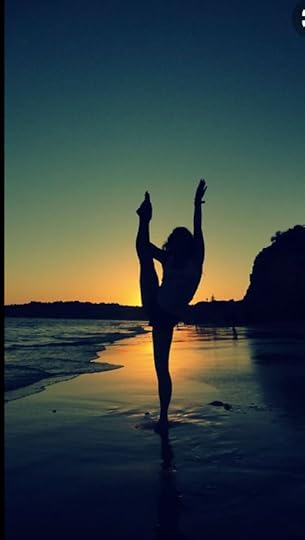
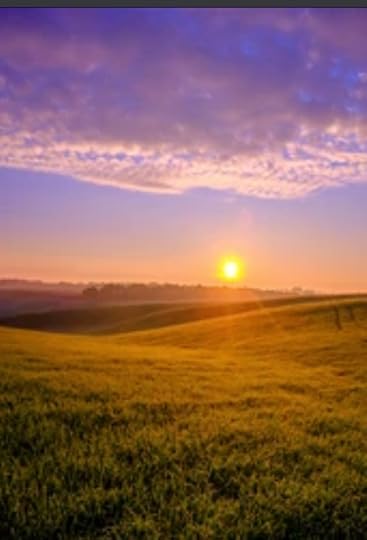

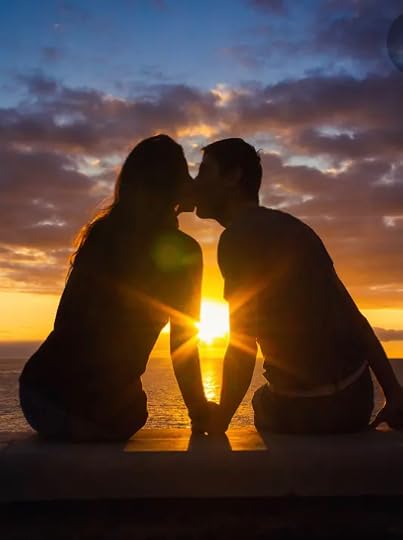
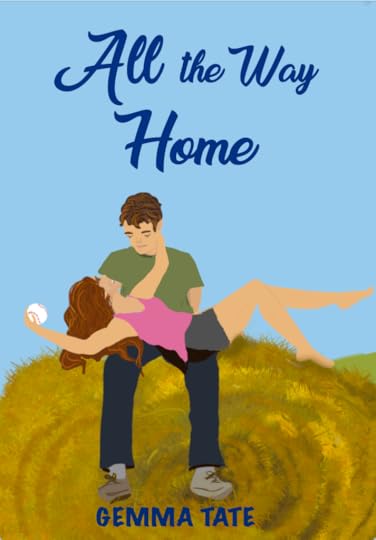
September 11, 2021
Ruminations on a New Year. Also, Bread.
I missed Wednesday and Friday, so let’s do a combined Foodie Friday and Writing Update Wednesday post, shall we? Yes, we shall. It’s my blog, and if you’re still reading it despite my apparent inability to stick to my own posting schedule, that’s on you.
First up, the life updates. It’s the High Holy Days! Shanah Tovah, to all of you reading this who celebrate. I’ve found it generally difficult to reflect back on the last year, mostly because it seems to run into last year too much, and then I feel overwhelmed by the nature of pandemic life and I have to get my brain to change the subject. I doubt that I’m the only one feeling like this. However, I can’t help but compare how I felt last Rosh Hashanah to how I feel this year, and recognize a general sense of hope.
Last year, it was a week into the semester and it still wasn’t clear whether or not my university was going to go back to in-person classes (we didn’t for another five months). I was on the island with my parents, brother, and grandmother. One silver lining for us was, like many families, we were able to spend more time together than we had in years. A drawback, however, was that none of us had spent time with anyone else in months. It wore on me, and badly—which is saying something, because I am at my core an introvert. But I remember feeling horribly isolated, unsure of how I was going to finish my thesis without access to a library, unmoored without a plan. I was hoping for something, anything different with the start of the year, and I struggled to understand how a pathway towards “better” could possibly emerge.
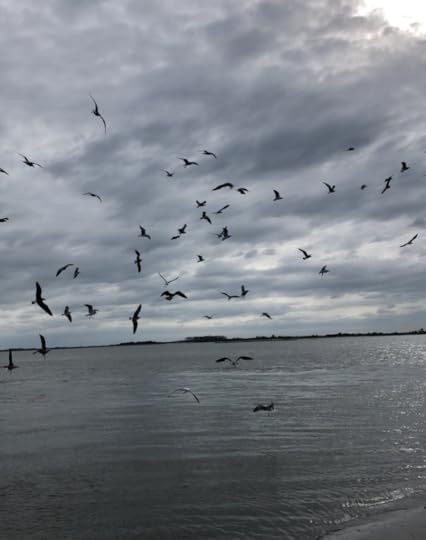 Last year: tashlich took place at the beach, surrounded by birds. At the time, we joked that it felt like an omen of some kind.
Last year: tashlich took place at the beach, surrounded by birds. At the time, we joked that it felt like an omen of some kind.
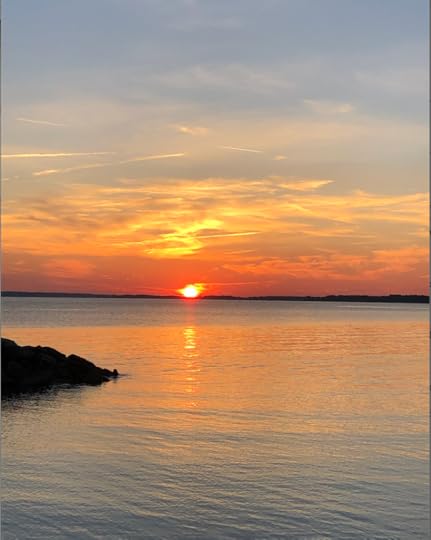 This year: tashlich on the shore of the James river, lonely but still vibrant and bright.
This year: tashlich on the shore of the James river, lonely but still vibrant and bright.This year, I am ensconced in a Master’s program at my dream university. I’ve spent the past year with my family and my friends, as we cautiously reintroduced a vaccinated, masked version of “normal” into our lives. I still struggle—the paranoia and the fear are sort of always in the back of my head. But it’s no longer borderline debilitating. I feel closer to good than I have in over a year, which is crazy to say.
Last year, I couldn’t bring myself to write. Fiction felt too escapist. Reality felt too real. I settled for writing serious academic papers on silly subjects—the feminist nature of fanfiction, for example, or the development of Vulcan calligraphy—and I threw myself wholeheartedly into papers about serious subjects that I couldn’t do anything about but at least I could write. But fiction and poetry just wouldn’t emerge, no matter what I did. I started and abandoned ten or fifteen projects over the course of a year. The closest thing to “new” that I managed was a short story that I meant to turn into a novel but didn’t.
This year, I’ve published a novel (All the Way Home! It’s out now, both ebook and paperback!) and I’m working on its sequel. I started writing fanfiction a little more avidly and I’ve found a phenomenal community there. I realized that writing rom-coms was a surprisingly good method of treating the overwhelming anxiety and frustration that draped over 5780 and 81. I’ve been writing poetry on a weekly basis. I still think there’s a long road to “good,” but I’m definitely at the checkpoint of “better.” And I think that’s important to recognize.
So, in the spirit of the holidays, I think I ought to talk about some food.
I always get a little homesick around this time of year, whether I moved a week ago or a month ago. I think there’s something about either going to services at a synagogue that is not my own, or streaming services from home like I’m doing this year, that just makes things feel a little too distant for my immediate comfort. So it made my day when a package of mandelbread (mandelbrot) arrived in the mail, as much of the rest of my family gathered on the island to celebrate. I, celebrating alone in my office in my apartment in Virginia, really needed that sense of connectivity found in food.
That said, I don’t have the recipe for those. So instead I’ll share what I made, in the spirit of the holiday. I love baking bread. I bake a lot of it, which is probably a habit that developed out of my mom baking a loaf of challah every Friday. So, this week, I put a festive twist on my own challah recipe—basically an apples-and-honey take on cinnamon rolls crossed with brioche and then braided into a round challah shape.
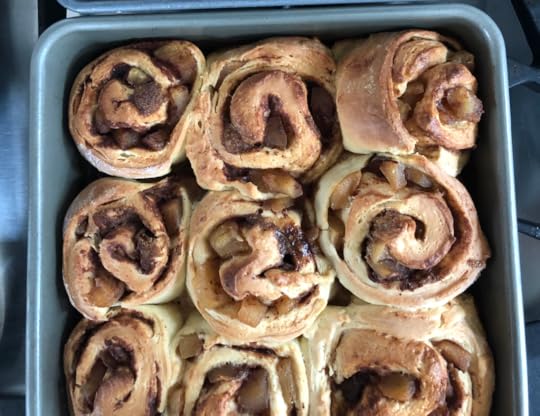
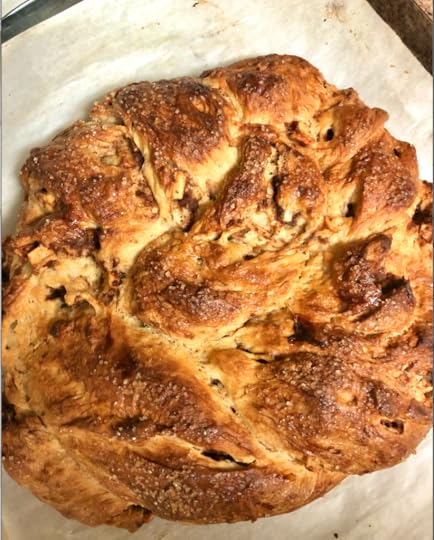 Left: the version of this I made for Rosh Hashanah breakfast last year, aka apple-pecan cinnamon rolls. Right: the version I made this year, the apple-cinnamon round challah.
Left: the version of this I made for Rosh Hashanah breakfast last year, aka apple-pecan cinnamon rolls. Right: the version I made this year, the apple-cinnamon round challah. And let me tell you, it was delicious.
I needed a taste of home, and because I had fresh challah on a holiday, I got it.
I needed something apples-and-honey because ‘tis the season, and it had it.
And I needed a reason to properly stress-bake, and there’s something about filling and shaping dough that just really does the job.
I make the dough pretty much to the letter of this Delish recipe, but I tend to change up the filling and shaping quite a bit.
Filling:
2 apples, chopped
½ cup brown or turbinado sugar
2 tbsp honey
3 tbsp cinnamon
1.5 tbsp melted butter
Mix all of this together, feel free to add some nuts or nutmeg or raisins as you please.Divide dough into 4 portions (this recipe makes a LOT, if you want a smaller challah it’s okay to either divide it in half or just set some of your leftover dough aside).Flatten each piece out into a long rectangle.Place a line of your filling down the center of each rectangle, and wrap the dough around them, sealing the fillings in.Now, do a 4-strand round-challah braid with your rolled-up, filled strands (you could also do a two-strand twist and just coil it up if that’s easier, but it won’t be a true challah).Tuck in all the ends, brush with an egg wash and maybe another teaspoon of sugar, and bake.And on that note, it’s Shabbat, I’m tired, and I’m back to living a (masked, cautious) proper social life. So… I’m going to leave this here.
Shanah tovah, everyone. May it be a sweeter, smoother year for us all, with plenty of apple-y, carb-y comfort this fall.
September 6, 2021
Biblical Bodies (A Poem)
We have all grown weary
Of men telling us to care about the concept of life
When ours are the ones that hang in the balance
It isn’t about babies or bibles, it’s about bodies
Bodies crawling with unwelcome hands
That we cannot seem to shove away
Bodies with unbroken bones
That don’t seem to stay that way
Our hands are no longer soft
Worn with calluses, with too much force
Trying to scrub out the bad days
Car keys carried between our fingers
Ready to scratch, to screech, to scare away
The well of our worry caved in completely
We fight now unmasked
Desperate, disparate, desolate
Begging for some absolution
From a sin we did not commit
Fuck Adam, he took the bite himself
Just like he once took you.
Pick up your olive branch.
Stripped of its fruit,
Barren in soil that will not grow
And brandish it.
They want us to use the master’s tools
But I maintain that this is not the master’s house
The house is the woman’s sphere,
And I say they hold no power here.
Our tools are those of sisters and of mothers
Of listening and standing up for each other
Words full of honey and heated steel knives
All packed away in chests meant for brides
Yes, we have grown weary
But we are the ones who work
Sweating, splintering, soldering
We emerge stronger from the crucible
Arms bound round one another
Hand in hand we form a chain
Linked-fence around our garden
That we tend, it is yours no more
No, you can’t come in.
We expel you back into the desert.
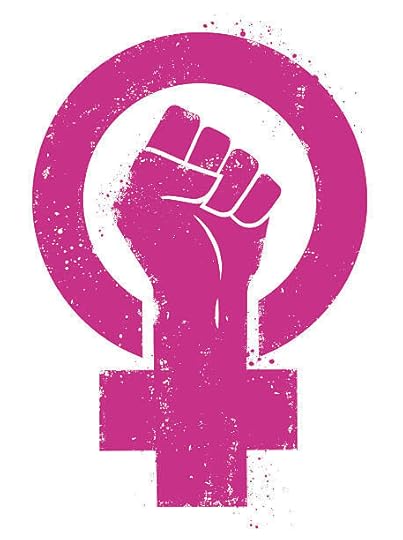
September 1, 2021
Once More Unto the Breach (also, a book release!)
Hey Internet,
As I mentioned in last week’s post, I had a whole month to recenter and to get my head on straight prior to the insane crush of the start of the school year. I took the time to get lost in the woods, to check in with myself, to check on my friends, to build healthy habits.
Well, the start of the school year is here, and with it, many, many things to fill my time. I’d say too many, but any of you who have been around here awhile know that “too much” is sort of my M.O. when it comes to school. So, what am I going to be up to?
I started a Master’s program in History this week. I’m so excited to be on campus and learning in person again—I’ve missed real interaction, especially in the context of education. Nervous, too, but my whole department is vaccinated and the grad students as a whole seem to be pretty responsible about masking. And at the end of the day, I think I have to make myself okay with things like meeting people for coffee or a drink again. Making new friends in the era of vaccinated-but-still-worried-about-Delta is hard, but necessary. I will say, I’m beyond thrilled to be back in a classroom, challenging myself, being challenged by people who know more than I do. I hate being the smartest person in the room, and here, I’m not. I get to learn every day from people who know more than I do, while simultaneously becoming more confident in my own skills and knowledge. It’s glorious.
I also started a new job—a grad assistantship, actually. I get to do research on behalf of the largest public history institution in the US. I get to look for and uncover stories that people aren’t talking about—stories that prove multicultural interaction, stories that talk about women and indigenous people and LGBTQIA+ people—anything I can find the evidence for. And then, if I’ve done my job right, it gets put into an exhibition created by leaders in my field (who I’m lucky enough to call my direct supervisors). I genuinely can’t believe I got this position. I’m already trying to figure out a way to do this full-time one day, when this MA program is over. It’s everything I love about each of the things I majored in as an undergrad, and it’s really everything I love about history and historiography. It’s truly my happy place and I’m just So. Excited.
And yes, as those of you who follow my social media know, I have published a book. All the Way Home came out at midnight last night, under my pen name, Gemma Tate. It’s a sports romance—more of a rom com than anything, really. In a lot of ways, it’s the kind of book I spent my summer craving– it’s sweet and snappy and full of witty banter and Southern small-town charm. I like to think of it as a story about finding dreams again, and learning to have faith in oneself. It’s the story I needed, coming out of a year riddled with setbacks—COVID, virtual school, blocked research opportunities, cut funding, writer’s block, cancelled trips, the end of my diving career, rejection letters. Writing it was a reminder that the path we’re on might not be leading where we think it is—and that’s okay. Dreams can change, people can change, and happy endings really do happen.
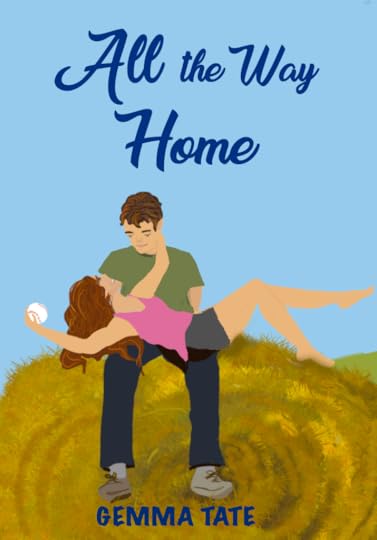
Feel free to access it here, or see the rest of my books and where to purchase them here.
In other news, I made a TikTok account for my pen name, Gemma (I’m gemma.tate.author on both TikTok and Instagram, if any of you are inclined to give me a follow). Weirdly, the process of doing so has reminded me to do two things:
Romanticize life a little bit. It’s 100% okay to take the time and make something aesthetically pleasing and set it to a whimsical acoustic soundtrack. It’s okay to make meals look Instagram-perfect, or to pretend that life is a happy montage set to Studio Ghibli music. Obviously, life isn’t always perfect, and obviously montages skip past some of the hard work. But for me, romanticizing the everyday and taking the extra moment to make it feel perfect genuinely makes me appreciate the little things—like pouring my tea, watering my plants, running on a dew-dappled trail at dawn, eating a cinnamon roll, doing my homework. Does this make me a cliché? Yes, absolutely. And you know what? I might be basic and predictable, but it makes me happy, and that’s all the defense I need.It’s okay to be a complete dork. I’ve never been particularly comfortable with myself on video—I’m the kind of person who will pose for a photo ten times to pick the best shot, who cringes when watching a self-tape play back. But apparently my alter-ego-pen-name-self likes to let loose a little bit and dance on camera, makes funny faces, and doesn’t care quite as much about appearances. Maybe it’s the relative anonymity? For whatever reason it works, and I think I could learn a lot from her.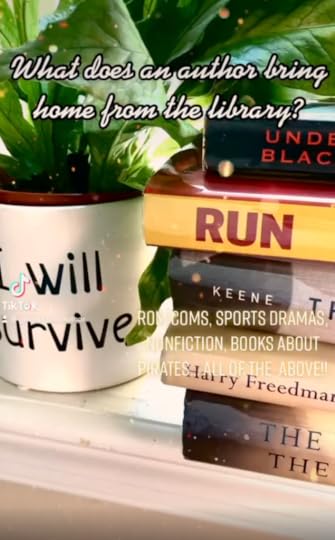
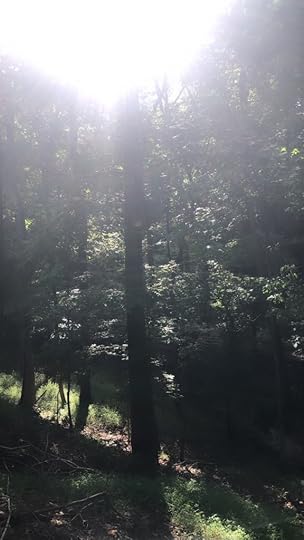
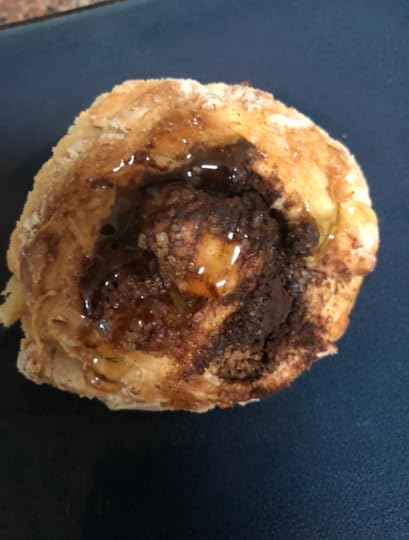
So there you have it—my Wednesday Writer Updates, or whatever I’m calling these now. I dunno, y’all—I’m feeling pretty darn excited about life these days. I hope you guys are feeling some of the same.
Sending good vibes to all, and signing off here. Happy Wednesday, everyone.
August 30, 2021
Of Rocketships: A Sonnet
I dream that I am on a rocket ship
Propelled through nebulas and space and stars
A distant planet’s prince makes winsome quips
As I hurtle past, going far, far, far
Away to distant worlds in hot pursuit
Of stories that I cannot find at home
Of pirates, knaves, and dames of ill repute
And yes, of days less smoggy monochrome.
My ship searches for saturated skies
With rich details, a thousand storied nights
If my world burns, let me have pretty lies
Believe pollution didn’t cause the lights
So I’ll pretend I’m in a fairy tale
And make believe all this will turn out well.



